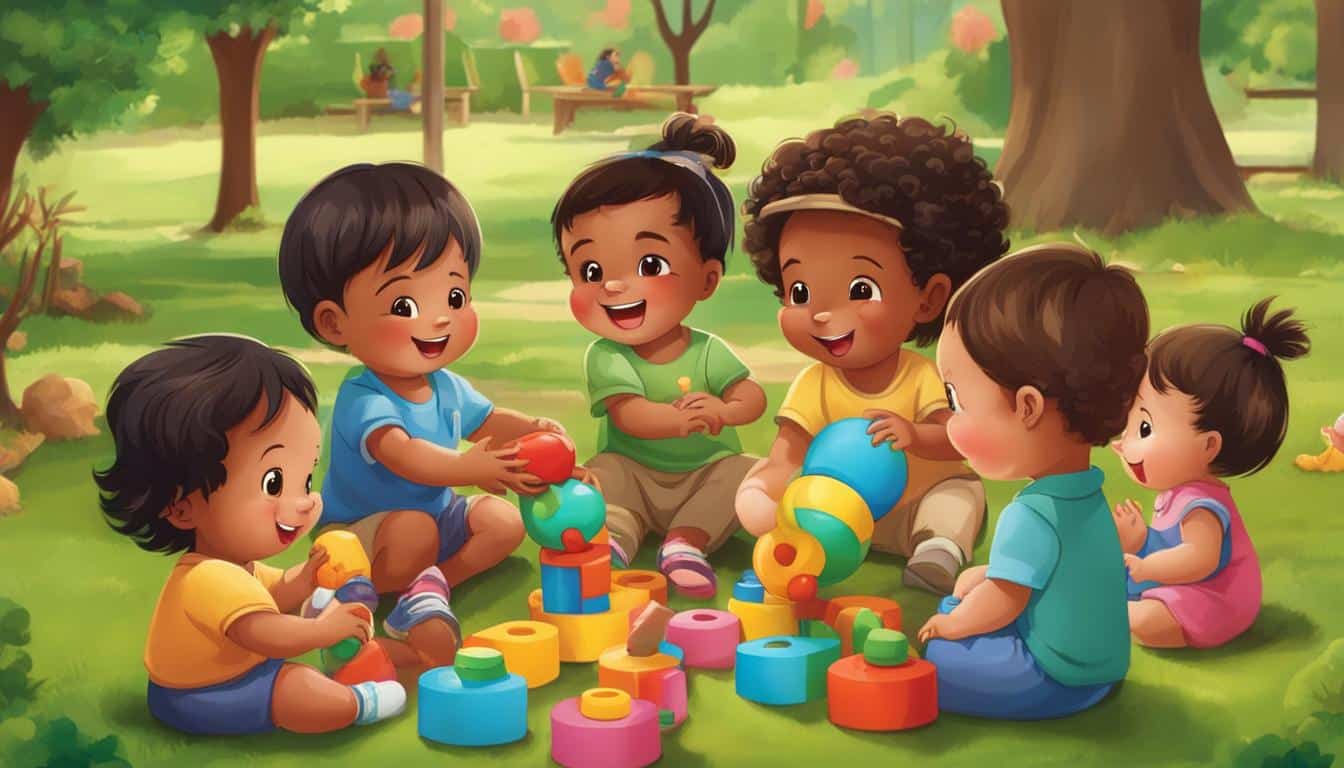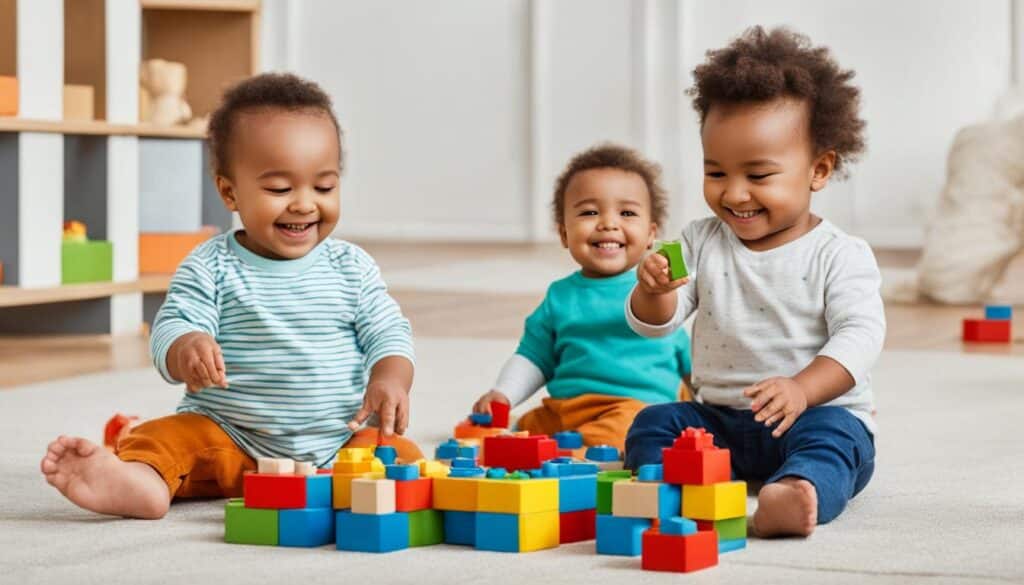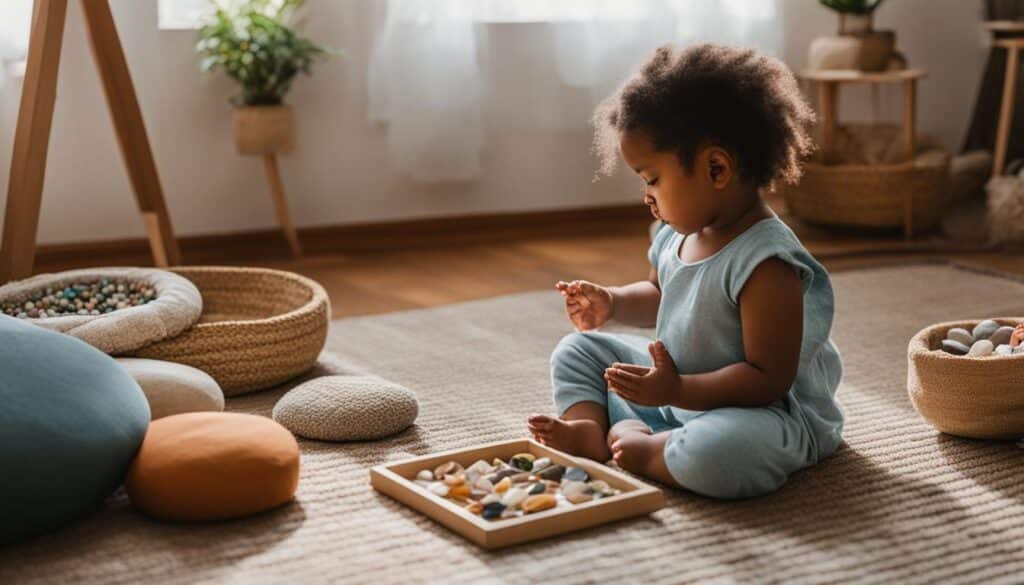
Developing Social Skills in Toddlers: A Guide for Parents
As parents, we want our children to grow up happy, healthy, and successful. One critical aspect of a child’s development is social skills. For toddlers, social skills development is crucial as it can help shape their attitudes, perspectives, and behaviors towards themselves and others throughout their lives. In this comprehensive guide, I will share valuable insights and practical tips to help parents nurture their toddler’s social skills.
Key Takeaways:
- Social skills development is essential in a toddler’s life, as it can shape their future attitudes and behaviors towards themselves and others.
- This guide will provide parents with valuable insights and effective strategies to help nurture their toddler’s social skills.
- Creating a supportive environment, promoting play and interaction, supporting emotional regulation, and encouraging positive peer interactions are all crucial for social skills development in toddlers.
- Parents should adapt these strategies to their toddler’s individual needs and developmental stage.
Understanding Social Skills Development in Toddlers
As a parent, it’s important to understand the significance of social skills development in toddlers before implementing any strategies. Social skills play a vital role in a child’s overall development and can impact their success in relationships and future studies and work.
The development of social skills in toddlers occurs in different stages, starting with simple interactions like looking at faces and eye contact to complex skills such as understanding humor and taking turns. It’s important to note that each child develops at their own pace, and there are individual differences in social skill development.
There are some common challenges faced during this critical period, such as difficulty sharing, taking turns, showing empathy, and understanding social cues. These challenges can be addressed by creating a supportive environment that encourages positive social interaction.
The Importance of Social Skills Development in Toddlers
The table below outlines the impact of social skills on a child’s development:
| Social Skill | Impact on Development |
|---|---|
| Communication skills | The ability to express thoughts, feelings, and needs clearly and understand others are key components of language and literacy development |
| Social problem-solving | Teaches children to analyze situations, consider alternative actions and make appropriate decisions |
| Cooperation and teamwork | Essential for collaboration and group work now and in future studies and working life |
| Empathy | Ability to understand and share the feelings of others is particularly vital as a foundation for successful negotiation, communication in relationships and working teams. |
Stages of Social Skills Acquisition
Social skills development progresses in stages, and toddlers develop social skills at their own pace. Here are the typical stages:
- 0-6 months: looking at faces and following objects
- 6-12 months: turn-taking with familiar adults and showing interest in other children
- 12-18 months: engaging in social games and sharing experiences with others
- 18-24 months: parallel play (playing alongside each other), taking turns and beginning to cooperate
- 24-36 months: cooperative play (playing together), problem-solving together, and developing empathy for others
Common Challenges in Social Skill Development
During the social skill development process in toddlers, there are some common challenges, which parents and caregivers need to address:
- Difficulty sharing
- Struggle with turn-taking
- Not showing empathy
- Not understanding social cues
It is crucial to remember that these challenges are normal and can be addressed with proper guidance and support.
“Social skills play a vital role in a child’s development, and parents should understand the stages and challenges of social skills development to quickly address them properly.”
Creating a Supportive Environment for Social Skills Development
As parents, we play a critical role in creating a nurturing environment that promotes social skills development in our toddlers. The home environment and early childhood education settings can significantly impact a child’s social interactions, communication, and empathy skills. Here are some practical ways to create a supportive environment:
- Create opportunities for socializing: Encourage your toddler to interact with other children in safe and supervised settings, such as playdates, parks, or daycare. Provide opportunities for your child to develop relationships and build friendships.
- Model positive behavior: Children learn by example, so be mindful of your own social interactions and communication with others.
- Encourage empathy: Help your child understand and identify emotions in others, and encourage them to show empathy by sharing toys, helping others, and listening to their peers.
- Provide consistent routines: A predictable daily routine can help children feel secure and confident, which can positively impact their social interactions and relationships with others.
- Limit screen time: Too much screen time can interfere with social skills development, so limit your toddler’s exposure to devices and encourage other forms of play and interaction.
A supportive environment is essential for nurturing social skills development in toddlers. By implementing these strategies, parents can help their children build the skills they need to navigate social relationships and interactions successfully.
Building Social Skills Through Play and Interaction
Play is essential for toddlers to develop social skills, just like it is for building cognitive and physical abilities. Different types of play can enhance social abilities, such as:
- Pretend play
- Cooperative play
- Group activities
Pretend play allows toddlers to develop their creativity while imitating adult behaviors and roles. Cooperative play improves skills such as sharing, taking turns, and problem-solving. Group activities such as circle time or singing enhance social interaction and cooperation.
I recommend parents be actively engaged during their child’s playtime, providing guidance and support while promoting the following skills:
- Sharing
- Turn-taking
- Conflict resolution
Positive reinforcement is crucial, so make sure to praise your toddler’s ability to share, wait their turn, or resolve conflicts appropriately. Suppose your toddler is showing challenging behavior during playtime, try not to intervene immediately. Instead, stay nearby and watch how they overcome difficulties independently. Encourage communication and empathy towards fellow playmates, and remember patience is essential.

“Play is often talked about as if it were a relief from serious learning. But, for children, play is serious learning. Play is really the work of childhood.” – Fred Rogers
Supporting Emotional Regulation and Empathy
Young children experience strong emotions, and it is crucial for parents to support their emotional regulation and empathy development. Helping toddlers recognize and express emotions constructively can contribute to healthy social growth. Moreover, promoting empathy and understanding towards others help them develop healthy relationships throughout their lives.
One of the most effective ways to support emotional regulation is by talking to toddlers, using words and phrases they can understand. Parents can also use calming techniques that suit their child’s personality, such as deep breathing or counting to ten. It is essential to create a safe space where children can express their emotions without judgment or fear of punishment.
Empathy development can begin at an early age. As parents, we can teach our children to recognize and identify emotions in others. We can encourage them to share, take turns, and play cooperatively. Reading books and watching movies that promote empathy can also be a helpful tool.
Some common emotional challenges in young children include frustration, fear, and tantrums. Parents can handle these situations by identifying the triggers, redirecting the child’s attention, and using positive reinforcement to encourage better behavior.

Supporting toddlers’ emotional regulation and empathy is vital to social skills development. By providing a safe environment, using effective communication, and fostering empathy, parents can help their toddlers grow into emotionally intelligent adults.
Encouraging Positive Peer Interactions and Socializing
As toddlers start interacting with peers, it’s crucial to foster positive social interactions and develop socializing skills. Positive peer interactions aid in improving their social skills, exhibiting empathetic behavior and improve their self-esteem.
Parents can facilitate social opportunities and encourage interaction with peers, so their toddlers learn to share, communicate and get along with others. Some of the effective ways to promote social confidence and overcome shyness in toddlers are:
Lead by example:
Parents should model appropriate social behaviors around their toddlers. Children follow by example, observing and learning from the adults around them. When parents exhibit empathetic and respectful behavior while interacting with others, their toddlers can replicate the same when they observe them.
Encourage communication:
Parents can encourage communication in their toddlers to boost their social skills. They may ask their toddlers to share their opinions, listen carefully, and respond appropriately. These actions help them understand the nuances of interaction and demonstrate how to carry out a conversation effectively.
Build friendships:
Parents may facilitate opportunities for their toddlers to socialize with peers in group settings during playdates or group activities. By playing in groups, toddlers learn valuable lessons about sharing, cooperation, and empathy, which are crucial for positive peer interactions.
| Activities | Description |
|---|---|
| Group Playdates: | Encourage playdates with other toddlers of the same age group. Group social activities facilitate the development of collaborative skills, sharing and team building traits. |
| Playful games: | Playing games such as musical chairs, duck-duck-goose, and Simon Says help to promote the skills of winners’ congratulating and losers taking the disappointment maturely, leading to social stability, and empathy. |
| Storytelling: | Storytelling sessions provide young children the opportunity to take turns speaking and promotes listening abilities. The caregiver can create a friendly environment in which the toddler voices opinions and thoughts on the storyline. |
Parents should regularly monitor their toddler’s socialization activities and provide feedback on their social developments. Communication is key, and parents can use positive reinforcement to show toddlers how to handle social experiences, learn how to display empathy, and engage in successful peer interaction.
Conclusion
In conclusion, I hope this guide has provided valuable insights and strategies to help parents support their toddlers’ social skills development.
Remember, social skills are a crucial component of overall development and play a significant role in shaping a child’s future success. By creating a nurturing environment, promoting play and interaction, supporting emotional regulation and empathy, and encouraging positive peer interactions, parents can foster essential social skills in their toddlers.
It’s important to keep in mind that every child is different, and social skills development is a gradual process. Be patient, adaptable, and supportive, and celebrate the progress your child makes along the way.
Thank you for reading, and I wish you the best of luck in your parenting journey.
FAQ
Why is social skills development important in toddlers?
Social skills development is crucial in toddlers as it lays the foundation for healthy interpersonal relationships, communication abilities, and emotional well-being later in life. It helps children navigate social interactions, understand and express emotions, and develop empathy and cooperation.
What are the stages of social skills acquisition in toddlers?
Social skills acquisition in toddlers typically progresses through different stages. Initially, they observe and imitate social behavior, then they engage in parallel play alongside peers, and eventually move towards cooperative play and interactive socializing.
What are some common challenges in social skills development for toddlers?
Toddlers may face challenges such as difficulty sharing toys, handling conflicts, taking turns, and understanding social cues. They may also struggle with emotional regulation, empathy, and adapting to new social situations.
How can I create a supportive environment for social skills development?
You can create a supportive environment by providing opportunities for social interaction, setting clear expectations for behavior, modeling positive social skills, and encouraging communication, cooperation, and empathy. Creating a safe and nurturing space at home and choosing quality early childhood education settings are also important.
How can play promote social skills development in toddlers?
Play is a powerful tool for enhancing social skills in toddlers. Pretend play allows them to practice social roles and problem-solving, cooperative play fosters collaboration and teamwork, and group activities encourage sharing, turn-taking, and negotiation. Parents can actively engage in play, provide age-appropriate toys, and encourage positive social interactions during playtime.
How can I support emotional regulation and empathy in my toddler?
Supporting emotional regulation and empathy involves teaching toddlers to recognize and express their emotions in healthy ways, validating their feelings, and helping them develop coping strategies. You can also model empathy, encourage perspective-taking, and provide opportunities to practice understanding and caring for others.
How can I encourage positive peer interactions in my toddler?
Encouraging positive peer interactions involves creating opportunities for socializing with peers through playdates, classes, and community activities. You can teach social skills like greeting, sharing, and taking turns, guide your child in resolving conflicts peacefully, and provide support and encouragement as they navigate friendships. Building social confidence and addressing shyness are also important.
How do I adapt these strategies to my toddler’s unique needs and developmental stage?
Every child is unique, and their social skills development may differ based on their temperament, personality, and developmental stage. It’s important to be patient, observe your child’s strengths and areas for improvement, and adapt these strategies accordingly. Tailor your approach to their individual needs, provide consistent support, and celebrate their progress along the way.